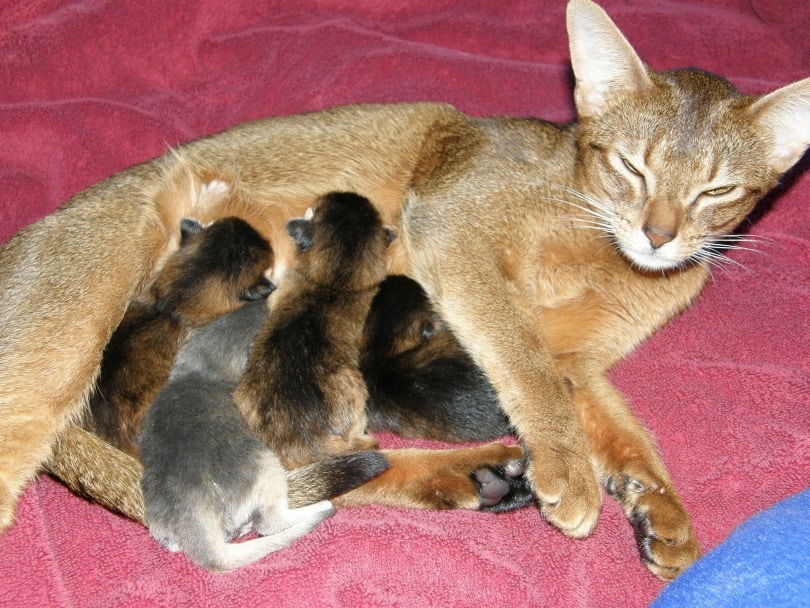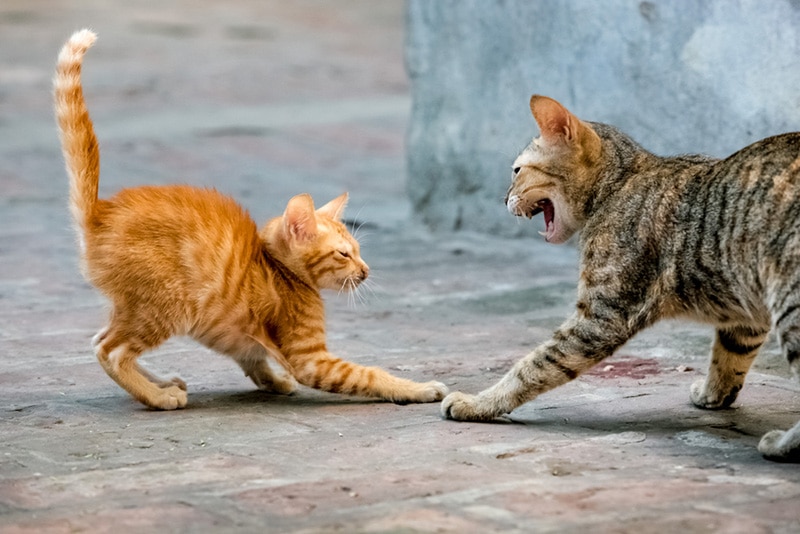Queens occasionally reject kittens who look like sick or spend less time caring for weaker ones once they have particularly large litters and never enough milk to offer adequate nourishment for all their babies. Mother cats sometimes stop giving their kittens attention but also can actively attack them, for quite a lot of reasons.
Once kittens grow old, the explanations mother cats may go on the attack vary from teaching boundaries to weaning. Contact your veterinarian for advice should you change into concerned about your cat’s behavior or the kittens’ welfare. Keep reading to learn more about 4 possible reasons mother cats attack older kittens.
The 4 Reasons a Mother Cat May Attack Their Older Kittens
1. Weaning
When cats are born, they’re depending on their moms for nutrition. As kittens age, their moms encourage them to eat regular food by pushing them away once they need to cuddle up and nurse.
The method can proceed until cats are entirely weaned, and most kittens need about 6-8 weeks before they’re fully weaned. In case your cat appears to be reacting assertively, specifically when her older kittens approach to nurse, there’s likely nothing to be fearful about because it’s probably just a part of the natural weaning process.
 Image Credit: Christiane Höfer, Pixabay
Image Credit: Christiane Höfer, Pixabay
2. Teaching Boundaries
Cats sometimes react aggressively when things change into too heated during playtime. Mother cats are primarily accountable for teaching their babies methods to interact with and get together with other cats and navigate the world. Cats often growl, bite, and use aggression to inform their feline friends it’s time to back off.
In case your cat is biting or hitting her kittens once they get carried away while playing, she’s likely teaching them their boundaries. The mother and her kittens often calm down after she disciplines them.
3. Redirected Aggression
Scared cats sometimes attack people and animals that don’t have anything to do with what’s upsetting them. As an illustration, a cat who’s upset with the family dog may attack the closest bystander as an alternative of the dog; it’s called redirected aggression and will also be triggered by things your cat sees happening outside.
In case your cat reacts aggressively toward her kittens after a showdown with one other pet, it could be redirected aggression. Allowing cats the time and space to calm down is critical in terms of controlling this form of behavior.
 Image Credit: Alfiya Safuanova, Shutterstock
Image Credit: Alfiya Safuanova, Shutterstock
4. Pain
Cats often hide signs they’re not feeling well; it’s an adaptation that helped them survive within the wild. It’s notoriously difficult to discover signs of illness in cats, as they’re often subtle and marked by minor changes. Cats that aren’t feeling well often withdraw and lose interest in interacting with people they sometimes need to spend every minute with, and so they may even lash out when feeling particularly under the weather.
Some bite and change into aggressive when painful parts of their bodies are touched. In case your cat generally appears to be lethargic otherwise you’ve observed other behavioral changes, make an appointment together with your vet to make sure nothing else is occurring that may very well be causing the behavior.

Conclusion
Mother cats can change into aggressive toward older kittens for several reasons, including setting limits and weaning. Pain also can motivate this form of behavior. Mother cats can go on the offensive when kittens’ play becomes a bit too enthusiastic.
Eliminating stressors and ensuring cats have comfortable environments that meet their needs can often go a good distance toward reducing overly assertive behavior in pets. Have in mind that punishing cats for aggressive conduct makes the situation worse. Cats showing signs of illness, corresponding to lethargy, lack of appetite, or withdrawal, should all the time be seen by a veterinarian in order that they will be diagnosed and treated.
Featured Image Credit: Volodymyr Plysiuk, Shutterstock

